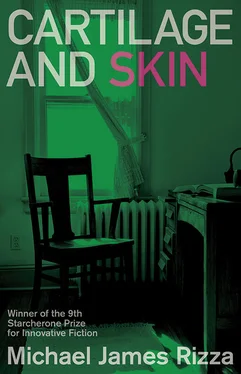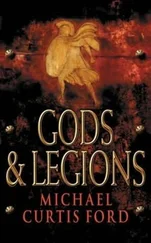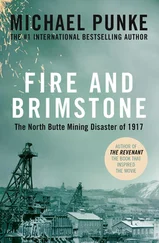After a while, a cold-bitten, watery-eyed woman joined me; she trailed behind her — attached by a purple mitten — a small, plump, excessively bundled creature, possibly a child, a dwarf, or a monkey, for only two black pupils peered out of a slit in a scarf that was wrapped around its fluffy-hooded head. When the bus came, the woman dragged the hobbling creature up the steps. As I started up behind her, I suddenly recalled one other incident during the misty day: Just before I had stepped inside the bus stop, I’d momentarily noticed a motionless figure standing against the building. Now, with some instinct or premonition arresting my stride on the bus steps, and with one hand holding the rail, I leaned out of the door and looked up the street. Everything appeared ordinary. Then I turned my head and searched in the opposite direction. Less than a block away, facing me, was a lone figure dressed in the same dark green baseball cap and corduroy jacket. I was immediately stunned. If not for the hydraulic hiss of the bus and the driver, ready to close the doors, giving the handle a brief, halting jerk — I might not have moved at all. But I stumbled up the steps and down the aisle. Once I was safely in my seat and the rumbling vehicle carried me away, my alarm began to settle down. In fact, I became amazingly calm, not because I convinced myself that the person on the street was a mere coincidence, but rather, deep down, I’d been conscious all along that he had been watching me. I’d been expecting it. Ever since the awful episode of the soiled boy, my body had been especially attuned to the threat of surveillance. Now, here it was at last, and perhaps by the clear spark of intuition or by some other sort of instant lucidity, I knew that it was not the watchful eye of the police, but the crazed glare of a slighted pervert.
The bus dropped me off a couple of blocks away from my destination and about an hour too early, so I had to find somewhere to wait. I started westward, in the direction I needed to go, suspecting that I might come across a place where I could sit down and drink a cup of coffee. The cold weather seemed to jab at the wound just above my temple, and the hat began to feel heavy upon my head, as though with every step a tourniquet tightened. I knew that W. McTeal was miles away, prowling about the vicinity of my home, waiting for my return. Yet I continued to look for him among the people on the sidewalk. Despite my alertness, I was somewhat blind, too preoccupied with W. McTeal and my imminent appointment, let alone with finding a coffee shop. I wasn’t really taking notice of my surroundings. Even so, I started to sense that something unusual was happening in the road; a long row of cars was double-parked; and on the sidewalk, many people were simply standing in small groups, forcing me to walk around them. They seemed mute, hushed, almost secretive. One or two played the emissary, milling about from group to group, passing along some quiet communication. It was an oddly disjointed collection of people, dressed alike in dark, dreary clothes. Just when I began to wonder what these people were up to, they all appeared to respond to a mysterious signal that only they and maybe dogs could hear, for they began to move, to step off the sidewalk, and to get into cars. I stopped walking, as one by one, the engines turned and idled. From the tailpipes, puffs of gray exhaust tumbled onto the pavement and then drifted upward, thinning and fading. After a moment, the cars started forward, one after another, in formation, each shining its headlights on the rear of the car in front of it. I looked toward the head of the line, for the hearse, but the row had already rounded the corner up ahead. Although the somber faces behind the windows didn’t turn and look at me, I sense that I was aligned with their grief and with the general sobriety of conspicuous mortality. I recalled that in older times, back when men wore black bands around their biceps, a person would show his respect for a funeral procession by stopping whatever he was doing, removing his hat, and quietly waiting until the last mourner was out of sight. Such customs must still exist, if not in the military then at least in small religious southern towns, where if not war then at least God served as a constant reminder of our vulgar fragility. When the final car turned the corner, I realized that despite the band cinching tightly around my skull, I’d forgotten to take off my hat.
The church was beside me, a monument of stonework, filled with stained glass, its spires reaching heavenward but tapering off to a point, possibly with a failing effort, a diminishing of faith, at which the architects of the Tower of Babel would have surely blushed and thought to themselves, Why not go higher? The building itself was set back at the end of a set of long, wide steps, as if the sidewalk, the road, all the other buildings, and thus the whole city block had been planned and erected around it. Lingering at the base of the steps, I looked up at a pair of large wooden doors. I felt a sort of instinctual and sudden revulsion, a physical reaction, as something inside my stomach turned loose and slimy. I took a deep breath and swallowed hard, confused by the abrupt change in me. Maybe the impression that the recent display of mortality had made upon me was now mixing with the aloofness of the ancient building and the frigid austerity of its masonry. Maybe my reaction had something to do with my appointment, the inflamed pervert, or the bits and pieces of my bovine neighbor. My disgust tasted as if it were bubbling up in response to something scatological, yet the church appeared hard and lifeless, unable to elicit the revulsion that I felt. I continued to stare at it. Although I was ordinarily indifferent to Christianity, dismissing it with a haughty wave of my hand, as most academics do, I now had an urge to mock it. I readily found the easy, common, and trite insults. I felt myself confronting the immensity, the absurd size, of the building. The whole towering edifice seemed disproportionate to the value I invested in it. By abstracting God from its history, I imagined that throughout the ages, many sexually troubled young men had looked toward the church; they hoped to discover their calling and thus to alleviate the pulse and anguish of their private lusts, yet these lonely men — who decided to commit themselves to self-denial, who were lured out of the cramped confines of their provincial homes, who were singly drawn from various parts of the land — soon found themselves assembled in a repressed and gaudy brotherhood, within the cold, quiet, stony chambers of the seminaries, amassed in their dormitories, congregated in bathrooms, and paired off secretly in darkened nooks; they were one body, sealed from the outside world for seven years, studying together to take their holy orders, finding release in one another, finding kindred pain, longing, and confusion, and finding sex — seven years of hushed and wicked pleasure — and so the supposedly sterile seminaries were hothouses in disguise, a secret club, which every season enticed new, troubled recruits who were hoping to extinguish their forbidden desire but soon discovered the welcoming arms and yielding bodies of their brothers in the Lord.
Inexplicably, my stomach was full of slime, and I spat on the steps.
What did I care about the sin, the sex, or the pretense. Yet I was angry. Although the building loomed above me, it seemed very far away, at an impossible distance, gloating in its own majesty, rather than condescending to the squat, shabby grime of low life — even though its stones, in fact, were less polished than they were weathered and soot-covered.
I spat again.
When I started to walk, I looked around, checking to see if anyone had seen my irreverence. I suspected that I wore my vehemence on my face and almost regretted no one was there to witness it. The intensity of my emotions was being wasted. Even so, not too far from the building, I began to feel silly. I was never that absurd fool who shook his fist at God; neither did I shake my fist at slugs or doorstops. The institution of religion, which was simply a manner of people, was a different issue. I couldn’t blame it for not remedying the problems of the world because I knew that the failure of Christian charity — of its feeding of the hungry and of its clothing of the poor — was in direct proportion to my own failure to adhere, as though I’d imagined charity wasn’t so much a product of footwork and sacrifice as it was a poof of smoke and a misty miracle.
Читать дальше












